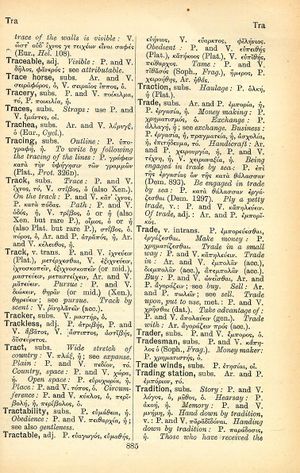tradition: Difference between revisions
From LSJ
διαμεμαστιγωμένην καὶ οὐλῶν μεστὴν ὑπὸ ἐπιορκιῶν καὶ ἀδικίας → striped all over with the scourge, and a mass of wounds, the work of perjuries and injustice
m (Text replacement - "<b class="b2">Bacch.</b>" to "''Bacch.''") |
m (Woodhouse1 replacement) |
||
| Line 1: | Line 1: | ||
{{Woodhouse1 | {{Woodhouse1 | ||
|Text=[[File:woodhouse_885.jpg|thumb|link={{filepath:woodhouse_885.jpg}}]] | |Text=[[File:woodhouse_885.jpg|thumb|link={{filepath:woodhouse_885.jpg}}]] | ||
===substantive=== | |||
[[story]]: [[prose|P.]] and [[verse|V.]] [[λόγος]], ὁ, [[μῦθος]], ὁ. | |||
[[hearsay]]: [[prose|P.]] [[ἀκοή]], ἡ. | |||
[[memory]]: [[prose|P.]] and [[verse|V.]] [[μνήμη]], ἡ. | |||
[[hand down by tradition]], v.: [[prose|P.]] and [[verse|V.]] [[παραδιδόναι]]. | |||
[[handing down by tradition]]: [[prose|P.]] [[παράδοσις]], ἡ. | |||
[[those who have received the clearest accounts by tradition from their predecessors]]: [[prose|P.]] οἱ τὰ σαφέστατα… μνήμῃ παρὰ τῶν πρότερον δεδεγμένοι ([[Thucydides|Thuc.]] 1, 9). | |||
[[the earliest of those whom we know by tradition]]: [[prose|P.]] [[παλαίτατος ὧν ἀκοῇ ἴσμεν]] ([[Thucydides|Thuc.]] 1, 4). | |||
[[the traditions of our fathers]], [[which we possess as a heritage coeval with our years]], [[no reasoning shall overthrow]]: [[verse|V.]] [[πατρίους παραδοχὰς]] ἅς θ' [[ὁμήλικας χρόνῳ κεκτήμεθ οὐδεὶς αὐτὰ καταβαλεῖ λόγος]] ([[Euripides|Eur.]], ''[[Bacchae]]'' 201). | |||
}} | }} | ||
Revision as of 08:50, 20 May 2020
English > Greek (Woodhouse)
substantive
story: P. and V. λόγος, ὁ, μῦθος, ὁ.
hand down by tradition, v.: P. and V. παραδιδόναι.
handing down by tradition: P. παράδοσις, ἡ.
those who have received the clearest accounts by tradition from their predecessors: P. οἱ τὰ σαφέστατα… μνήμῃ παρὰ τῶν πρότερον δεδεγμένοι (Thuc. 1, 9).
the earliest of those whom we know by tradition: P. παλαίτατος ὧν ἀκοῇ ἴσμεν (Thuc. 1, 4).
the traditions of our fathers, which we possess as a heritage coeval with our years, no reasoning shall overthrow: V. πατρίους παραδοχὰς ἅς θ' ὁμήλικας χρόνῳ κεκτήμεθ οὐδεὶς αὐτὰ καταβαλεῖ λόγος (Eur., Bacchae 201).

